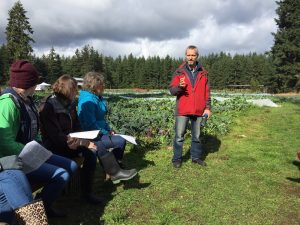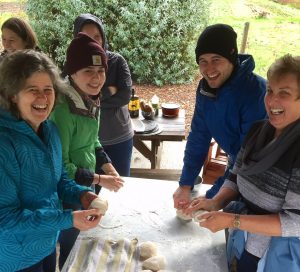Where on Earth Are You?
Creation, Creation Care , StewardshipContributed by: Food for the Hungry Canada
WRITTEN BY SHELAINE STROM
Originally published on Togethering
Can you describe the soil around your home? Could you identify five resident and migratory birds in your area? Which way is north from where you are sitting?
These are just three of twenty questions our Food for the Hungry (FH) staff were challenged with last week on our professional development day at A Rocha, an environmental stewardship organization. The point of the exercise was to reflect more deeply on where we are situated on the planet and to be more attentive to creation.
I can point North with confidence.
Many of the other categories left me pondering. I don’t think I can trace our water supply from rainfall to my tap nor can I say exactly where my garbage goes. To be honest, my world isn’t shaken by lack of this knowledge. I’m not sure that’s good news.
I found the overall experience eye-opening as I recognize now how disconnected we suburbanites generally are to the created world. We heard that as high as 80 percent of children today do not regularly spend time in nature, or even outside in a city park.
So what does it take to become a better citizen of Planet Earth? What can I do in my own little yard that will make any difference, let alone have global impact? These were some of the topics we discussed with the A Rocha staff.
The answers surprised me.
Yes, we talked about reducing our consumption of material goods and resources like fuel. Yes, we covered reusing items rather than being part of the “throw-away” crowd. Yes, we even touched on recycling. But those weren’t the central points.

FH staff engage with an info session with Rick Faw.
When asked, “What can I do to make a difference for the health of our planet?” Rick Faw, Acting President of A Rocha replied, “Cultivate wonder.”
Seriously? Cultivating wonder will rid us of pollution, see fish return to local streams, and reduce landfills? I needed to hear more. He expanded, beginning with this quote.
“We care for only what we love. We love only what we know. We truly know only what we experience.” Steven Bouma-Prediger
Pointing out the number of bugs hiding under a rock can create a desire in children to explore. Tracing veins in a leaf gives opportunity to talk with youngsters about a tree’s life-giving properties. Silently breathing in the majesty of mountain views together instills awe in little people.
Experiencing nature, in all of its glory, lays the foundation for creation care and stewardship in future generations.
And these practices aren’t just for kids. I find myself being challenged, too.
Will I take time today to look at trees popping with gold, orange, and burnt sienna and give thanks for the wonder of seasons? Could I consider ways to consume less and share more, possibly opening doors to new relationships with neighbours? Am I willing to evaluate my choices through the lens of stewardship?
I am going to find the names of those birds living in my backyard. And apologize for not getting to know them sooner.

Whipping up homemade pizza for the outdoor brick oven

